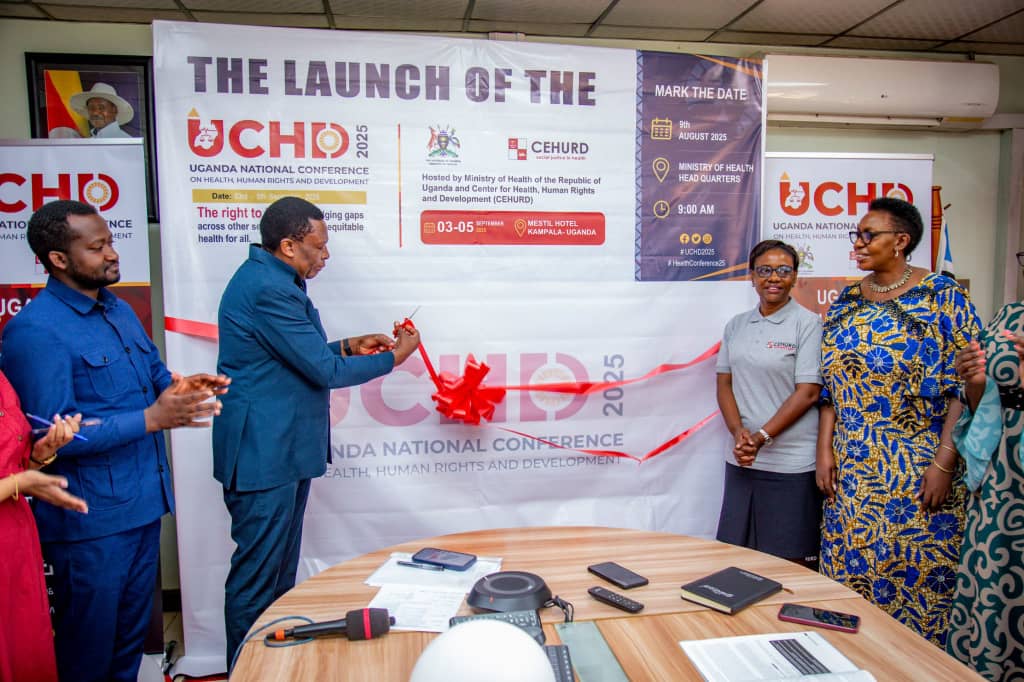
 Mama FM
Mama FM

 Mama FM
Mama FM
9 August 2025, 4:14 pm
By Byamukama Alozious
The Ministry of Health of Uganda, together with the Centre for Health, Human Rights and Development (CEHURD), has officially launched the 2nd Uganda National Conference on Health, Human Rights and Development (UCHD 2025), scheduled to take place from 3 to 5 September at Mestil Hotel in Kampala. The event will bring together more than 350 delegates from government, civil society, academia, the private sector, and international partners to discuss innovative approaches for advancing social justice in health.
Speaking at the launch, Dr Charles Olaro, Director General of Health Services, emphasised the importance of looking beyond hospitals and clinics to understand what truly shapes health outcomes. He pointed out that health is influenced by a broad range of social determinants such as access to clean water and sanitation, quality education, housing, transport, food and nutrition, environmental factors, social inclusion, and non-discrimination. These factors, Dr Olaro said, must be considered collectively if Uganda is to achieve equitable health for all citizens.
“The conference theme, ‘The Right to Health: Bridging Gaps across Other Sectors to Achieve Equitable Health for All,’ underscores the need for a collaborative, multi-sectoral approach,” Dr Olaro said. “By bringing together diverse voices, we aim to spark a deeper conversation on how these social determinants influence health and identify cross-sectoral actions that can improve health equity and outcomes at every level of society.”
Dr Olaro also highlighted that the conference will build momentum towards Uganda’s goals of Universal Health Coverage (UHC) and the Sustainable Development Goals (SDGs), serving as a platform to share evidence, best practices, and innovative solutions.
During the launch, Fatia Kiyange, Executive Director of CEHURD, stressed that healthcare services account for only about 20 per cent of people’s health outcomes, with the remaining 80 per cent shaped by social determinants such as income, housing, education, and access to resources and power. She highlighted sexual and reproductive health rights as a critical area, noting that beyond clinical care, individuals must be able to make informed decisions about their bodies and lives free from stigma and discrimination.
Kiyange referred to the 2021 World Health Assembly resolution calling on member states, including Uganda, to adopt multi-sectoral policies addressing social determinants of health. She gave the example of transport, explaining that injuries from road accidents are a leading cause of death and disability, yet responsibility lies outside the health sector. She urged a shift from focusing solely on treating diseases to addressing the underlying social factors that shape health outcomes.
Speaking on food and nutrition, Agnes Kirabo, Executive Director of the Food Rights Alliance, warned that contaminated and poorly managed food significantly contributes to Uganda’s disease burden. She revealed that approximately ten per cent of Ugandans fall ill due to what they eat, often because of chemical contamination and improper handling of food products such as milk, meat, grains, and vegetables.
Kirabo called on all actors in the food chain—from farmers and traders to consumers—to take responsibility for ensuring safe, nutritious food. “We are what we eat,” she said. “The current mismanagement in food production and handling is pushing too many people into hospitals. It is time for the agriculture sector to focus not only on quantity but also on quality, and for all of us to work together to reduce this burden on our health system.”
She further emphasised that health is deeply connected to social and environmental conditions and encouraged bold collaborative actions to build stronger, healthier communities.
The conference will focus on critical issues including non-communicable diseases, food and environmental safety, transport, and sexual and reproductive health. A key goal is to generate a comprehensive action plan emphasising prevention and cross-sector collaboration to address these interconnected challenges and accelerate progress towards equitable health for all Ugandans.